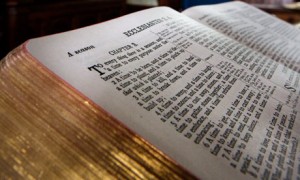 What You Should Know Before Reading The Bible
What You Should Know Before Reading The Bible
By Kristin M. Swenson, Ph.D., 06/ 9/11 02:17 PM ET
…
This essay might, alternatively, be called “On Not Reading the Bible.” But then I must hastily add: I’m not against reading the Bible. Not exactly, anyway. Thing is, the Bible doesn’t lend itself to reading straight through for understanding in the ways that modern books do. It is a wildly unusual book, and there is a big difference between simply reading it and knowing about it.
Simply reading the Bible (really reading it, in any of its three main forms, all the way through) without any background information results more often than not in bewilderment and confusion, leaving readers at the mercy of others to interpret for them. Why is there so much concern about dermatological conditions, so little about homosexuality, and nothing explicitly about abortion? How many animals did Noah take into the ark — two of every kind, or seven pairs of some kinds? Where is Zion in relation to Jerusalem? Was the Last Supper on Passover or not? Why does Isaiah prophesy, “they shall beat their swords into ploughshares” and Joel prophesy, “they shall beat their ploughshares into swords”? Does God disapprove of, or demand divorce? Why would Paul praise Phoebe as a deacon and also say that women shouldn’t teach or have any authority? And what’s with the “whore of Babylon”?
Without any background information, simply reading the Bible is not only really hard (Leviticus, anyone?), but also it can lead to all sorts of problems. Some are innocuous misunderstandings, such as today’s Ezekiel 4:9 breads and cereals — cheerfully confident that the recipe is biblical and their preparation mandated by God. Trouble is, God did not urge people to make the bread out of righteousness or anything healthful and good. Rather, God forced the prophet-priest to make it by mixing things that were supposed to be kept distinct in order to show how bad things would be for the sinful people in Babylonian exile. Made by breaking the biblical commandments that respect God’s ordered universe, the original bread was meant to communicate uncleanness and disgust. (The modern versions are delicious nonetheless.)
Other uninformed readings can have terrible effects. Take, for example, the Bible’s assumption of slavery as an acceptable, normal human institution. A quick review of the challenges facing abolitionists in antebellum America reveals how many God-fearing Christians appealed to the Bible to justify keeping slaves. Then again, there is Jesus’ command to pluck out your eye or cut off your hand if said anatomy leads to sin; and there’s the mandate for Israelites to kill all the people who lived in the land they understood to be promised to them. Most people today have seen the ways that flatly reading Bible can lead to supercessionism, misogyny, and a devastating environmental ethic.
Sure, there’s some overlap between reading and knowing — just by reading, you’d observe that the Bible includes both a seven-day creation story and a Garden of Eden creation story, for example. But just by reading, you also might think that “LORD” is emphatic for “Lord,” or that Jesus was at odds with the Jews. Knowing about the Bible, though, you’d understand why there are two different creation stories, that “LORD” is a convention in English translations for the Hebrew four-letter name for God (and not the translation of a word meaning “lord”), and that Jesus himself lived and died as a Jew.
Knowing something about the Bible — its historical backgrounds and development, its languages of origin and the process of translation, and its use within religious communities as well as secular contexts — enables readers to make sense of biblical texts and references for themselves. For religious people, such knowledge can enrich their faith; and nonreligious people may appreciate better why the Bible has endured with such power and influence.
Now, I know that many Christians, relying on biblical texts, maintain that the Holy Spirit will make the meaning of biblical texts clear to believers. And I don’t deny it, but maybe you know this story: The Church decided to establish a monastery in a wild, rural area. Some time later, the bishop paid a visit, to see how things were going. After reviewing the buildings and activities, the bishop wandered admiringly in its lovely gardens. To the monk toiling there, he said, “My, my! The good Lord and you have made a beautiful place.” The gardener monk replied, “You should see how it looked when the good Lord was taking care of it by himself.”
One of the things that I love about the Bible is its resistance to reduction. By way of a few examples, there are several stories of creation and four different narratives of Jesus’ life, death, and resurrection. Consider the coexistence of explanations of suffering as punishment and the book of Job. Yet declarative and absolutist statements beginning, “the Bible says,” and bumper stickers such as “God said it. I believe it. That settles it” are commonplace.
When people urge others first to read the Bible, it’s usually because the recommender assumes that they’ll come away sharing the same beliefs as the recommender’s. Knowing some background information (the more, the better) about the Bible is bound to lead instead to fruitful discussion. Maybe it’s there, in the spaces of informed conversation about a multi-faceted Word of God, in the dynamism of humble learning and listening, that the Holy Spirit pulls up a chair and the Bible reveals its richest meanings.
http://www.huffingtonpost.com/kristin-m-swenson-phd/reading-the-bible_b_874242.html or http://huff.to/iiDtY1 or http://tinyurl.com/5rcrq7m
